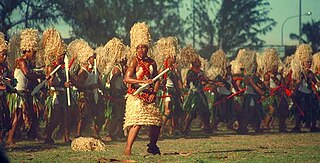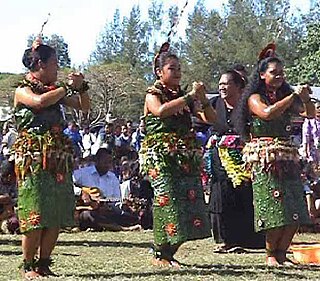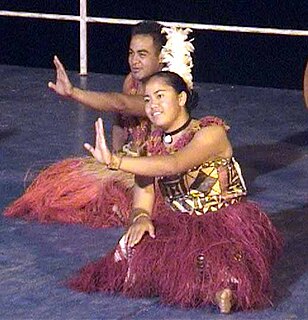Related Research Articles

Tonga, officially named the Kingdom of Tonga, is a Polynesian country and also an archipelago consisting of 169 islands, of which 36 are inhabited. The total surface area of the archipelago is about 750 km2 (290 sq mi) scattered over 700,000 km2 (270,000 sq mi) of the southern Pacific Ocean. As of 2021, Tonga has a population of 104,494, 70% of whom reside on the main island, Tongatapu. The country stretches approximately 800 km (500 mi) north–south. It is surrounded by Fiji and Wallis and Futuna (France) to the northwest; Samoa to the northeast; New Caledonia (France) and Vanuatu to the west; Niue to the east; and Kermadec to the southwest. Tonga is about 1,800 km (1,100 mi) from New Zealand's North Island.

Music of Tonga refers to music derived from the island Tonga in the islands of Polynesia. Music of Tonga today generally falls under the category of traditional music that has withstood the test of time, or into one of the two opposing genres of religious and secular music. Tongan music can be either very emotional and somewhat modern with instrumental makeup including modern brass instruments, or conversely can be more traditional and consist of only drums and voices. In this way, Tongan music is very diverse despite the fact that it is contained to a fairly small island, which means that the different cultures and styles co-exist on the small land mass together without blending.
The kailao is a cultural dance from the South Pacific country of Tonga. It originates from Wallis and Futuna.

The Tonga national rugby union team represents Tonga in men's international rugby union and it's nicknamed ʻIkale Tahi . Like their Polynesian neighbours, the Tongans start their matches with a war dance – the Sipi Tau. They are members of the Pacific Islands Rugby Alliance (PIRA) along with Fiji and Samoa. The Ikale Tahi achieved a historic 19–14 victory over France in the 2011 Rugby World Cup, but having lost to New Zealand and Canada, were unable to achieve what would have been their first-ever presence at the quarter-finals.

The Tongan archipelago has been inhabited for perhaps 3000 years, since settlement in late Lapita times. The culture of its inhabitants has surely changed greatly over this long time period. Before the arrival of European explorers in the late 17th and early 18th centuries, the Tongans were in frequent contact with their nearest Oceanic neighbors, Fiji and Samoa. In the 19th century, with the arrival of Western traders and missionaries, Tongan culture changed dramatically. Some old beliefs and habits were thrown away and others adopted. Some accommodations made in the 19th century and early 20th century are now being challenged by changing Western civilization. Hence Tongan culture is far from a unified or monolithic affair, and Tongans themselves may differ strongly as to what it is "Tongan" to do, or not do. Contemporary Tongans often have strong ties to overseas lands. They may have been migrant workers in New Zealand, or have lived and traveled in New Zealand, Australia, or the United States. Many Tongans now live overseas, in a Tongan diaspora, and send home remittances to family members who prefer to remain in Tonga. Tongans themselves often have to operate in two different contexts, which they often call anga fakatonga, the traditional Tongan way, and anga fakapālangi, the Western way. A culturally adept Tongan learns both sets of rules and when to switch between them.

The tauʻolunga is a traditional Tongan dance. It is a combination of the Samoan Taualuga and the Tongan ula. The type of dance is comparable with (some) Hawaiʻian hula or the Tahitian ʻaparima.
The ula (dance) is an ancient Tongan group dance, already reported by early European navigators like captain Cook. It is also known as fahaʻi-ula, which may be degenerated to fahaʻiula. Traditionally it is performed after an ʻotuhaka. It is still danced nowadays, although less popular than its descendant the tauʻolunga.

The ʻotuhaka is a traditional Tongan group dance with prominent Sāmoan influence wherein the performers are seated and make gestures with their arms only, with some accentuation from head and body.
The māʻuluʻulu is a traditional Tongan dance, performed by a group of seated men and women; stylistically, the dance form is a direct successor of the ancient Tongan ʻotuhaka having been synthesized with the Samoan Māuluulu which was imported during the 19th century.
The lakalaka is a Tongan group dance where the performers are largely standing still and make gestures with their arms only. It is considered as the national dance of Tonga and part of the intangible human heritage. It is the ideal dance at formal occasions, like the birthday of the king or the opening of a church.
The meʻetuʻupaki is an ancient Tongan group dance, already reported by early European navigators like captain Cook. This dance has been traditionally designed for men although women may take part if there are not enough men. The meʻe tuʻu paki resembles a kind of war dance; albeit, it is done with little symbolic paddles as opposed to arms.

Rugby union is the national sport of Tonga. Tonga are considered to be a tier 2 rugby nation by the International Rugby Board.

Rugby union is the national sport in Tonga. Sumo has a following, while football, judo, surfing, volleyball, and cricket have gained popularity in recent years. Rugby league and Australian football are also played.

In Uvea (Wallis) and Futuna culture and modernity co-exist. In particular, dance is considered to be part of everyday life. One sees dance in fakahaha'aga (festivals), to'oto'oga, or just for pure pleasure. In Uvea, the term faiva is used for dance, whereas the term mako is used. In Uvea and Futuna there is a katoaga which is only celebrated with the visit of chiefs and if lucky, with the Lavelua (King). As the years go by, dance and culture is still alive and well in Uvea and Futuna. The normal fakapale is given to the dancers for their magnificent dance. The following dances of Uvea and Futuna below are just some of the dances, or are the main dances seen in Wallisian and Futunan culture.
Fe'ao Moe Lotu Vunipola is a Tongan former international rugby union player who participated at the 1995 Rugby World Cup and 1999 Rugby World Cup. He is the father of Mako Vunipola and Billy Vunipola, and is married to Rev. Iesinga Vunipola, Methodist minister and chaplain to the UK Tongan community. He moved to Wales in 1998 to sign with Pontypool, and in 1999 joined up with Pontypridd. He left to join neighbours Caerphilly in 2001.

As female residents of Tonga, women in Tonga had been described in 2000 by the Los Angeles Times as members of Tongan society who traditionally have a "high position in Tongan society" due to the country's partly matriarchal foundation but "can't own land", "subservient" to husbands in terms of "domestic affairs" and "by custom and law, must dress modestly, usually in Mother Hubbard-style dresses hemmed well below the knee". Based on the "superficial dealings" of LA Times Travel Writer, Susan Spano with the women of Tonga in 2000, she found that Tongan women were a "little standoffish", while Patricia Ledyard, former headmistress of a missionary school for girls in Tonga, confirmed that such "aloofness" of Tongan women were due to the nation's "rigid class system" and the country's "efforts to retain its cultural identity". There were presence of Tongan women who are professionals engaged in jobs as travel agents, as vendors selling an "exotic cornucopia of root vegetables and tropical fruit(s)", and as basket weavers.

Sila Puafisi is a Tongan international rugby union player, currently playing for La Rochelle in the Top 14. He previously played for Glasgow Warriors.
Manu Vunipola is a Tongan former rugby union player and former Tonga sevens coach. He played as scrum-half. Currently he is the Minister of Sport of Tonga.
Elisi Busco Vunipola is a Tongan former rugby union player. He played as fly-half.
Samiuela Moli is a New Zealand born Tongan rugby union player who plays for the Tasman Mako in the Bunnings NPC and Moana Pasifika in Super Rugby. His position of choice is Hooker.
References
- ↑ Firitia Velt (1991). "The ʻotuhaka among the other Tongan dances". ʻOtuhaka, a Tongan Dance (PDF). Nukuʻalofa: Atensi Institute. p. 4. Retrieved 18 January 2022.
- ʻI.F. Helu; Faikava